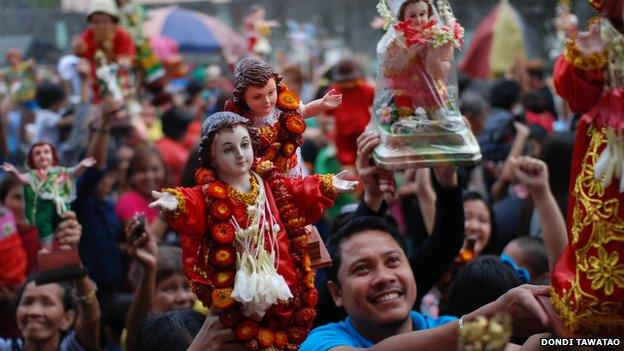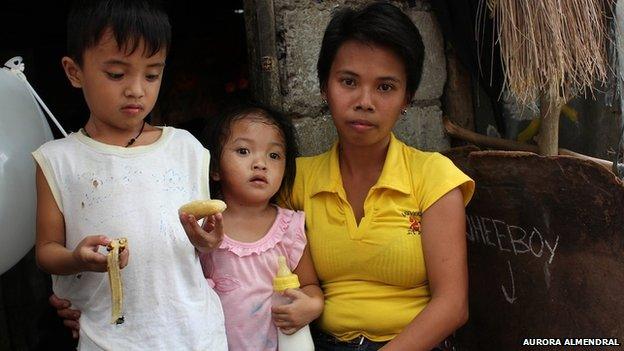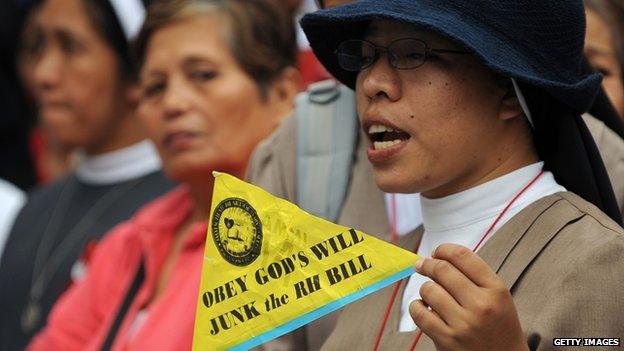Is Catholic Church's influence in Philippines fading?
- Published

The Roman Catholic church has deep roots in Philippine society
The Catholic church plays a powerful role in the Philippines but last month it lost a significant battle in its bid to prevent a government-backed family planning programme. Aurora Almendral asks if the church is losing its grip on the islands.
In the last five years, Jennievic Betana, who is just 24 years old, has been pregnant four times.
She lives with her three surviving children in a small, crumbling cement-block house together with two brothers and husband, Buboy, in the vast slum of Bagong Silang in northern Manila.
Buboy, a barber, earns about 300 pesos (£4, $7) a day, two-thirds of which goes to feeding the family. The burden of the extra mouths to feed is considerable.
To avoid adding to their family, Jennievic and her husband rely on the calendar method, an arrangement that nevertheless resulted in the last two unplanned pregnancies.
A practising Catholic, Jennievic knows that contraception is a sin in the eyes of the church, but says she is willing to take the spiritual risk for more immediate financial concerns.
"I want to use birth control," Jennievic says, "but after paying for food, electricity and water, there's nothing left. I'll use it, even though I know it's a sin.
"If [the Church] were to help us once the children are here, then sure, I'll have more children. But they don't."
Jennievic's story is typical of many in the Philippines which has one of the highest population growth rates in Asia.
Currently, the country is adding nearly two million people every year to its 100-million-strong population. This is putting a massive strain on resources, especially for the poorest among whom much of the recent growth has been concentrated.
There is also the issue of illegal abortions, of which there are an estimated 600,000 a year. Some 90,000 of the women having these procedures are later hospitalised and about 1,000 die.

Jennievic Betana and two of her children
Ugly episodes
This issue was recognised many years ago, when the Reproductive Health Bill was introduced in the Philippine congress back in 1999.
Its aim was straightforward, to provide contraceptives to those who wanted and most needed them. But it has proved to be one of the most divisive issues to have been debated by congress in recent history.
Conservative politicians opposed the bill and were backed by a horrified Catholic Church which fought against contraceptives from the pulpit and in the streets.
"There were some ugly episodes," says Risa Hontiveros, a former congresswoman, women's rights activist and prominent supporter of the bill.
Priests denied communion to community health workers, campaigned against politicians supportive of the bill, and even threatened President Benigno Aquino III with excommunication.
The ensuing battle dragged on for years.
With 81% of Filipinos defining themselves as Catholic, the country's culture and society is intimately intertwined with the teaching of the church.
Laws are often framed around Catholic values. Alcohol and cigarettes are taxed for being "sins".

The battle over legislation providing contraception to the poor was hard-fought
Abortion, euthanasia and same-sex marriage are deeply frowned upon, and the Philippines is the only country in the world, besides Vatican City, where divorce remains illegal.
Fight from the pulpit
The Church has long wielded much more than spiritual influence.
In a show of formidable political power, the Church rallied the faithful to help overthrow Ferdinand Marcos in 1986, a feat it repeated in 2001 to oust then-president Joseph Estrada.
When the church's final legal challenge to the bill was overturned, the defeat had some in the Catholic Church, worried.
Archbishop Oscar Cruz, who has twice served as president of the Catholic Bishops Conference of the Philippines, the church's governing body, admits that the passing of the bill "shows that the church is losing influence over its members".
According to Allen Surla, professor of political science at De La Salle University, a Catholic institution, this is to do with the changing media landscape.
Under the Marcos dictatorship, he says, the pulpit was the main source of information, dissenting or otherwise.

The church campaigned against the bill in the pulpit and the street
These days, the church's teachings are vying for influence with many other sources of opinion in newspapers, radio, TV and the web.
"People are much more socially aware now than they were 20 or 30 years ago," says Prof Surla.
Church 'too controlling'
Despite its efforts to demonise contraception, widespread support for the church's position never materialised. A poll taken in 2010 found that 70% of Filipinos supported the bill.
Corazon Quinalayo, 52, a homemaker just leaving mass at Quiapo Church, one of Manila's most holy sites, says she does not support the reproductive health bill, but nor does she agree with the church hierarchy.
She believes making contraceptives available for free is an endorsement of promiscuity and a waste of government funds.
But she says the church is "being too controlling. It's like they're not giving people their freedom."
Quinalayo adds that, however misguided, "the government is just trying to help".
The 9 April decision of the Philippine Supreme Court to unanimously uphold the constitutionality of the law is seen as a victory in the eyes of women's rights activists and other supporters, who rallied outside the courthouse.
Risa Hontiveros says the mood after the announcement was "ecstatic".
"There was cheering, crying and unadulterated joy. This was the fight of our lives," she says.
Big fights ahead
As a Catholic herself, Hontiveros says it was painful to see the church try to assert its power over women's bodies, but says she never felt conflicted about her support for the bill.
"This will assist the majority of Filipinos who are poor," she says.
"They won't be overwhelmed by too many children. They won't be snowed under by the demands of the every day. It will improve maternal health and allow women to pursue more education or livelihoods."
Meanwhile, the church, licking its wounds, is looking ahead to other battles to fight.
"Contraception is no longer the issue. It's passe," says Archbishop Cruz, predicting further fights over divorce, abortion and same-sex marriage.
"I'm looking forward to it," he says, "because it's going to be a big fight."